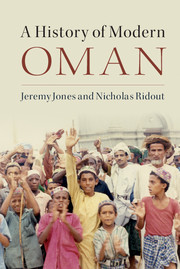Book contents
- Frontmatter
- Contents
- List of Figures
- List of Maps
- Acknowledgements
- Map
- Introduction
- Part One Foundations
- Part Two Modern History
- 4 The Sultanate as Nation, 1932–1959
- 5 Dhofar
- 6 Oil, Government and Security, 1955–1980
- 7 Shura, Diplomacy and Economic Liberalisation, 1980–2000
- 8 Oman in the Twenty-First Century
- Bibliography
- Index
6 - Oil, Government and Security, 1955–1980
from Part Two - Modern History
Published online by Cambridge University Press: 05 September 2015
- Frontmatter
- Contents
- List of Figures
- List of Maps
- Acknowledgements
- Map
- Introduction
- Part One Foundations
- Part Two Modern History
- 4 The Sultanate as Nation, 1932–1959
- 5 Dhofar
- 6 Oil, Government and Security, 1955–1980
- 7 Shura, Diplomacy and Economic Liberalisation, 1980–2000
- 8 Oman in the Twenty-First Century
- Bibliography
- Index
Summary
The future success of the new Omani state would depend upon both social and political development. This was the advice repeatedly offered to Sultan Said and with increasing insistence from at least 1955. At that time it came primarily from British military and political sources, and especially from those directly or indirectly involved in the Sultan's campaign against the Imamate. In order to secure the newly, but perhaps provisionally unified state, the Sultan would have to replace traditional tribal political structures, in which people looked to tribal leaders for all their basic needs – employment, justice, education – with a new administration organised around his own power. This would require a new conception of government: rather than an ultimate source of authority, to whom quasi-autonomous tribal shaikhs might turn at times of crisis or need, the Sultan himself would have to become a provider of services, offer a responsive and day-to-day involvement in the lives of people scattered across extensive territories. This would obviously require resources.
Many commentators, both at the time and subsequently, have noted the Sultan's failure or reluctance to act on this advice, and some of these have attributed his failure or reluctance, as we have already seen, to the Sultan's personality and upbringing, his resistance to change, his aversion to financial risk or his lack of interest in the political challenge. Others note, more sympathetically, that the Sultan's aversion to financial risk was strongly motivated by his desire to maintain and enhance Oman's independence from the kind of foreign political influence (particularly British) that he associated with debt. From Sultan Said's perspective, as we have seen, one of the aims of the intervention in the interior from 1954 was to create the conditions in which the commercial exploitation of oil might transform the country's financial position. This would provide the resources that would make social and political development possible. But until this basic condition for development was met, there was no incentive to embark on a programme of major change and some considerable risk involved in disrupting existing modes of government and social life.
- Type
- Chapter
- Information
- A History of Modern Oman , pp. 161 - 194Publisher: Cambridge University PressPrint publication year: 2015



